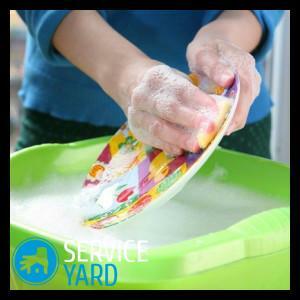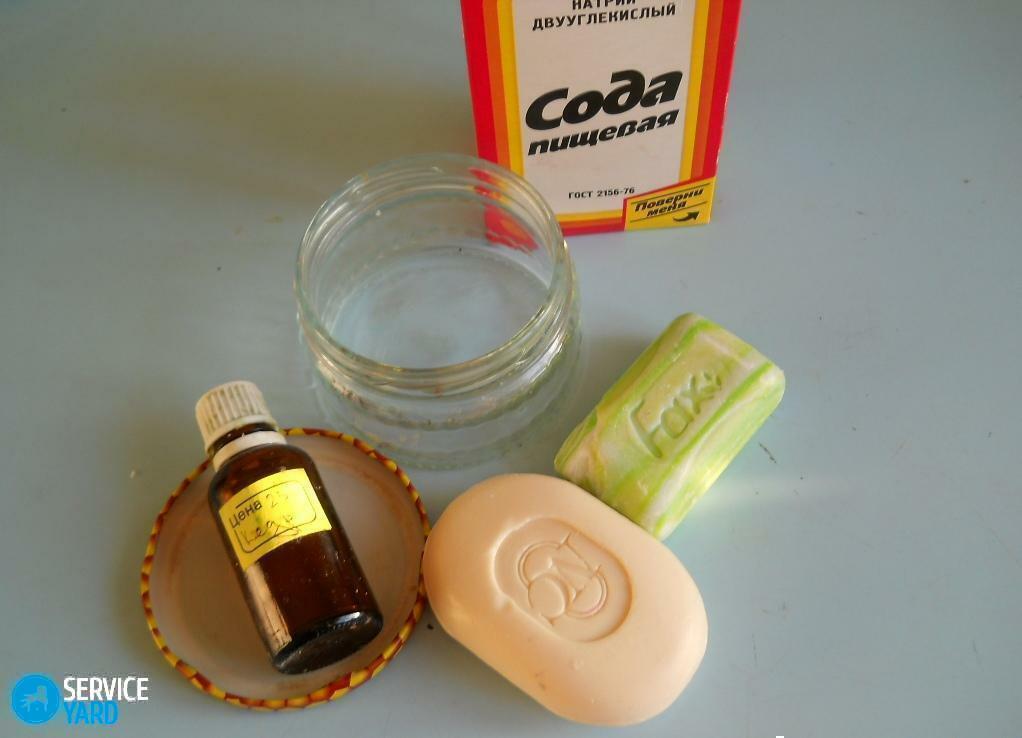
- Homemade dishwashing detergents - what are the options?
- Detergent from soap and soda
- Washing liquid for dishware
- Gel-pasta for washing dishes
- Mustard as a dishwashing detergent
- Cleaning liquid from peroxide and soda
- The main advantages and disadvantages of self-made detergents
In the modern market, the buyer is provided with a huge selection of all kindshousehold products for cleaning surfaces, including washing liquids for washing dishes. But often the price for quality effective means is high. In addition, as part of the purchased detergent, many components that adversely affect health. But you can turn to "grandmother's recipes" and prepare a dishwashing detergent with your own hands, while spending at least a minimum of money.
to the contents ↑Homemade dishwashing detergents - what are the options?
Homemade products differ in the quality of cleaning utensils, but in any case, cost several times cheaper than purchased fluids, and rarely cause allergies due to the fact that you determine the most suitable composition yourself. And among the variety of recipes for self-preparation of such liquids and gels, you can choose the most effective.
Consider several recipes, how to make a dishwashing detergent at home.
to the table of contents ↑Detergent from soap and soda
This product is suitable not only for washing dishes, but also for cleaning various surfaces in the house, including washing the plumbing.
Important! In the composition there are no substances that could cause allergy or cause any harm to the environment, therefore the remedy can be safely called environmentally friendly.
Components of
For its manufacture you will need the following ingredients:
- Baby or household soap( 1 piece);
- Baking soda( 250 g, or half-packs);
- Hot water( 0.5 l, or two glasses).
How to cook:
- Slice of soap on a grater and pour hot water. Soap should be dissolved.
- Mix the mixture until a thick soapy foam forms.
- In the process of whipping, add a little soda.
- If you want to give the product a pleasant aroma, then add a few drops of pleasant essential oil.
Put the finished product in a suitable container, for example a bowl or plastic container.
Important! Such a dishwashing detergent prepared by own hands, despite its simplicity, is strong enough and cleans even calcareous plaque( you need only take a little longer to allow the substance to have time to act in full force).
to the table of contents ↑Dishwashing liquid
This dishwashing detergent can be made by anyone.
Important! It easily and quickly washed off fat, and, although consumed less economically than purchased fluids, the cost goes much cheaper.
Components
For the preparation of liquids you will need:
- Hot water( 0,5 l, or 2 cups);
- Household soap( 25 g);
- Glycerin( 4 tablespoons);
- Vodka( 1 tablespoon).
How to cook:
- Soap the soap with a little water and put it on a hot water bath.
- Gradually pour all the water into the mixture so that the soap completely dissolves.
Allow to cool off the finished base, and then add glycerin and vodka. - Mix everything until a homogenous mixture is obtained, remove the formed foam from the surface.
- Pour the finished product into a bottle with a dispenser and let it brew for several hours.
Important! Instead of a water bath, a microwave oven can be used to heat the solution.
When thickened, the liquid turns into a gel that forms a thick foam when used, and the glycerin contained in it will not allow the active substances to dry the skin.
to the table of contents ↑Gel-paste for washing dishes
The gel can be used to wash dishes and various surfaces in the house.
Important! It is suitable for fighting strong contaminants: you need to apply the finished detergent to the desired area and leave for a few minutes, and then just wipe with a damp sponge or cloth.
Components of
To create a dishwashing gel at home you will need:
- Hot water( 0.5 l, or 2 cups);
- Household soap( 25 g);
- Baking soda( 3 tablespoons);
- Ammonia( 4 tablespoons);
- Mustard powder( 3 tablespoons).

How to cook:
- Piece of laundry soap to grate on a fine grater, pour water and wait until all chips are dissolved.
- To the cooled liquid basis, add mustard, soda and ammonia, mix thoroughly.
Important! With ammonia it is possible to work only in the open air or in a well-ventilated room.
- The finished gel should be placed in a suitable container, close, so that ammonia does not fade, and leave for a few hours.
- The tool is now ready for use.
Mustard as a dishwashing detergent
If you do not want to mess with the preparation of detergent liquids, you can use ordinary mustard powder:
- You need to dilute a small amount of the powder in water and during the washing process, wet the sponge in the solution.
- If the dishes are very small, then pour mustard directly onto the sponge.
After the application of mustard and rinsing from the fat there will be no trace!
Important! Mustard dries heavily the skin of the hands. To avoid undesirable consequences, you can use a cream or glycerin after contact with a product containing mustard. The latter can be added to the product during cooking.
to the contents ↑Cleaning liquid from peroxide and soda
If it is necessary to clean the glass or any surface, but it is difficult to wash off soap foam, and the mustard scratches the material, you can make a dish detergent yourself without soap and mustard powder. To wash off such liquid it is not necessary, and if nevertheless it will want to clean it from a surface - it is enough to wipe a surface a sponge or a rag.
Components of
The composition of this tool is very simple. You will need:
- Hot water( 250 ml, or 1 glass);
- Hydrogen Peroxide( 1 teaspoon);
- Soda( 1 teaspoon).
How to prepare:
Ingredients are mixed, the finished liquid is poured into a spray gun and sprayed onto contaminated areas.
Important! The liquid is ideal for washing glassware, tables, plates and sinks. Also it can be used as a stain remover when washing things.
to content ↑The main advantages and disadvantages of self-made detergents
Homemade dishwashing detergents have several advantages over purchased products:
- All components are in a penny store, so the product will cost much less than any purchased. In addition, most ingredients are at home for everyone, so for cooking a small amount you do not need to go to the store in search of everything you need.
- Do not have substances that could harm your health, including causing allergies, and the environment.
- Easily washed away without remaining on the dishes after rinsing, but making the dishes clean.
But these liquids have their drawbacks:
- For preparation it is necessary to spend some time, while purchased means are already sold.
- Self-made cleaning fluids are consumed much faster than purchased ones, the reserves will often have to be replenished.
- The quality of washing can be slightly worse than that of the purchased ones. However, after a while you will find the means that suit you.
But even with such a consideration of the situation, the advantages cover up the shortcomings, because health and safety are important, and the time spent pays off in full.
All health and cleanliness in the kitchen!



